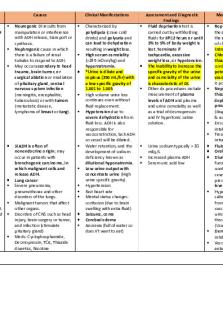Endocrine case study 2 MED SURGE 1 PDF

| Title | Endocrine case study 2 MED SURGE 1 |
|---|---|
| Course | Bass Iv |
| Institution | University of Nevada, Las Vegas |
| Pages | 2 |
| File Size | 53.7 KB |
| File Type | |
| Total Downloads | 8 |
| Total Views | 159 |
Summary
ENDOCRINE ASSIGNMENT CASE STUDY ASSIGNMENT MED SURHE 1...
Description
ENDOCRINE CASE STUDY Genevieve is a 45-year-old woman with three children who works part time and has recently returned to nursing school. She has sought care from her primary care provider. While taking a health history, Genevieve tells the nurse that she has noticed that she is feeling very tired, is cold all of the time, and has gained 15 pounds without a change in eating habits. 1. What other symptoms could accompany hypothyroidism? Other symptoms that could accompany hypothyroidism include hypotension, bradycardia, decreased contractility, decreased cardiac output, constipation, slowed metabolism, slow speech, hair loss, brittle nails, dry skin, numbness/tingling in fingers, goiter, slowed mental processes, and myxedema. Genevieve’s provider performs an assessment, noting that she has cool skin, brittle nails, coarse and dry hair, slight abdominal distension, and poor wound healing on an older cut. The provider orders laboratory work. 2. Which laboratory tests would assist in confirming a diagnosis of hypothyroidism? Laboratory tests that would assist in confirming a diagnosis of hypothyroidism include T3 serum levels, T4 serum levels, TSH levels, and iodine levels. Laboratory results indicate a decreased T3 and T4, and a high level of TSH. Genevieve is diagnosed with hypothyroidism, and placed on levothyroxine (Synthroid).
3. What priority concerns should the nurse identify? The nurse should identify the following priority concerns: monitor the patient’s respiratory status and identify oxygenation needs; monitor apical heart rate during the initiation of the medication; make sure the patient takes the medication with a full glass of water 30min-1hr before eating; make sure the patient does not crush, chew, or split medication that is in capsule form; make sure the patient is taking the medication 4 hours from taking any antacids, cholesterol reducers, and calcium supplements.
Ed is a 17-year-old football player who experienced a head injury while playing football. Ed was diagnosed with traumatic brain injury (TBI) and is currently undergoing TBI rehabilitation. 1. What signs and symptoms would alert the nurse to the possible post-trauma complication of diabetes insipidus (DI)? Confusion, lethargy, nocturia, fatigue, tachycardia, decreased blood pressure, dehydration, and increased thirst are all symptoms of diabetes insipidus.
2. What laboratory findings are consistent with DI? Increased urine output up to 20L a day, decreased specific gravity, increased serum osmo >300 mOsm (water deprivation test), hypernatremia, hypovolemia, increased blood pressure and heart rate
The primary care provider has prescribed desmopressin, 10 mcg nasally every 8-12 hours. 3. What teaching points should the nurse provide to Ed regarding nasal inhalation of desmopressin? Take the dose at the same time everyday. If you miss a dose, you can take it when you remember it, however if it is close to when you need to take the next dose, then skip the missed dose. Side effects include stomach pain, heartburn, difficulty falling asleep or staying asleep, nose bleeds, nasal pain and discomfort, itchy and light-sensitive eyes, and sore throat. You MUST contact your healthcare provider if experiencing vomiting, chest pain, rash, hives, itching, and difficulty breathing or swallowing....
Similar Free PDFs

TEST #1 Med Surge ll
- 8 Pages

Endocrine Case Study
- 3 Pages

Med Surge Hesi Review
- 5 Pages

ATI units 2 3 8 - Med surge
- 26 Pages

Endocrine Case Study Week 3
- 8 Pages

Med-Surg Endocrine
- 11 Pages

Med surg 1 case study renal
- 3 Pages

Endocrine Study Guide Answers
- 6 Pages
Popular Institutions
- Tinajero National High School - Annex
- Politeknik Caltex Riau
- Yokohama City University
- SGT University
- University of Al-Qadisiyah
- Divine Word College of Vigan
- Techniek College Rotterdam
- Universidade de Santiago
- Universiti Teknologi MARA Cawangan Johor Kampus Pasir Gudang
- Poltekkes Kemenkes Yogyakarta
- Baguio City National High School
- Colegio san marcos
- preparatoria uno
- Centro de Bachillerato Tecnológico Industrial y de Servicios No. 107
- Dalian Maritime University
- Quang Trung Secondary School
- Colegio Tecnológico en Informática
- Corporación Regional de Educación Superior
- Grupo CEDVA
- Dar Al Uloom University
- Centro de Estudios Preuniversitarios de la Universidad Nacional de Ingeniería
- 上智大学
- Aakash International School, Nuna Majara
- San Felipe Neri Catholic School
- Kang Chiao International School - New Taipei City
- Misamis Occidental National High School
- Institución Educativa Escuela Normal Juan Ladrilleros
- Kolehiyo ng Pantukan
- Batanes State College
- Instituto Continental
- Sekolah Menengah Kejuruan Kesehatan Kaltara (Tarakan)
- Colegio de La Inmaculada Concepcion - Cebu







